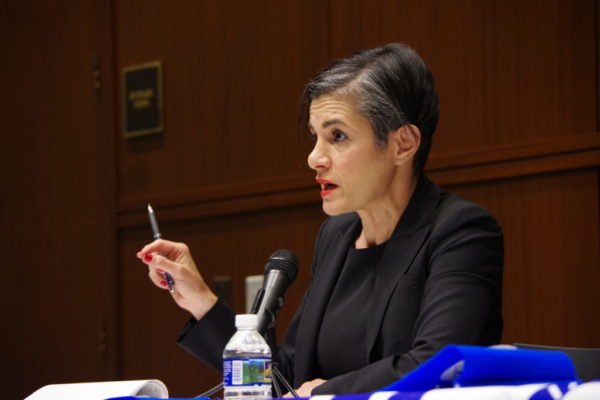Earlier this month the Arlington and Falls Church prosecutor’s office obtained convictions in two cases involving sex crimes and children.
And the county’s top prosecutor, Parisa Dehghani-Tafti, took to Twitter last week to do something she said she has “never previously done: comment on the outcome of cases in our office.”
As Commonwealth’s Attorney, Dehghani-Tafti has held back her thoughts on previous plea deals reported on by ARLnow: one involving a man who threw dogs over a balcony to their death, a second regarding a man who brought a bag stuffed with marijuana and hashish oil through Reagan National Airport, and most recently, the Uber driver who struck the owner of Advanced Towing with his car.
She broke her customary silence to highlight her office’s work on the sex crimes cases, although she said she could not discuss specifics given the sensitive nature of the two cases.
“Pride in the team is the short answer,” she said. “These cases are really challenging, and the team did a fantastic job under the hardest of circumstances.”
Cases involving sex crimes and minors are difficult for a number of reasons, she said, including the victims’ age, the trauma inflicted on them and their family, family dynamics and the quality and quantity of evidence.
As for the timing, she said the office has only recently been able to have jury trials regularly since the pandemic shut down jury proceedings.
“We were only two months into the administration when COVID-19 happened, and we had no chance to have a jury trial,” she said. “We did what we could to keep the system functioning, but there were no trials for a long time. Lately, we’ve had a number of trials, and we’ve won most of them.”
On Twitter, she explained that one reason convictions in these cases are difficult to attain is due to a lack of physical evidence. Anecdotally, Dehghani-Tafti tells ARLnow prosecutors are more reluctant to take on such cases, as a victory isn’t as clear, and the office’s conviction rate impacts funding.
“Right now, the funding formula for Commonwealth’s Attorneys in Virginia is felony sentencing events and charges, so the incentive is to make sure that you file the most serious charges and you get as many convictions as you can, because that’s what keeps you funded,” she said.
6/9 However, in our office, our goal is not to rack up easy wins on minor cases but to do the hard cases that matter even if it means we risk losing. This is especially true when it comes to crimes of sexual violence and crimes against children.
— Parisa Dehghani-Tafti (@parisa4justice) August 20, 2021
Dehghani-Tafti said she’s motivated to take on challenging cases because of the stories she’s heard of prosecutors avoiding harder cases and picking “easier wins.”
“The one elemental core of my philosophy of criminal prosecution is that our first and last duty is to focus on serious crimes, particularly crimes against the most vulnerable among us,” she wrote on Twitter.
That said, Dehghani-Tafti said she is relying on her background in innocence cases to make sure that goal doesn’t result in wrongful convictions.
“I feel like I’m in a particularly good position to weigh that in the balance,” she said. “If I say we have the evidence and everything is fair, that means making sure we’re using good forensics, making sure we don’t have tunnel vision, getting corroborating statements — really doing the follow-through on the investigative work to support whatever theories there are.”
While proud of her team of attorneys and paralegals, she said convictions are only one part of how a victim or family heals.
“Not all victims want the same thing,” she said. “Not all are waiting for a trial, prosecution or plea. Sometimes, the victims themselves are not the ones pushing the hardest for prosecution and retribution. There’s a whole spectrum of what victims want and need: Some have been waiting for this, and others have either wanted to work out their cases… through diversion.”
9/9 I’m under no illusion that a conviction will repair the harm that’s been done, nor bring closure, to these families; the system is ill-equipped to do that. But prosecuting these cases is one way we can bear witness to the pain that’s been visited upon vulnerable victims.
— Parisa Dehghani-Tafti (@parisa4justice) August 20, 2021
As for whether Arlingtonians can expect more openness in the future, Dehghani-Tafti said what she can say about cases is limited to publicly-accessible court documents.
Commonwealth’s Attorneys in Virginia, she wrote, “are governed by a strict ethical code, requiring us not to make public comments about pending cases if they could go to a jury trial. This code applies even if the case is one of public concern, and even when others cherry pick facts and make misleading statements.”
“As prosecutors, our silence is the way we respect the privacy of victims, protect the rights of defendants, and safeguard the integrity of the system,” Dehghani-Tafti wrote. “It allows trials to take place in courtrooms and not in the media.”


